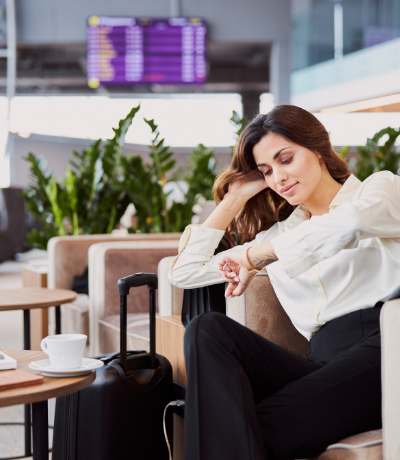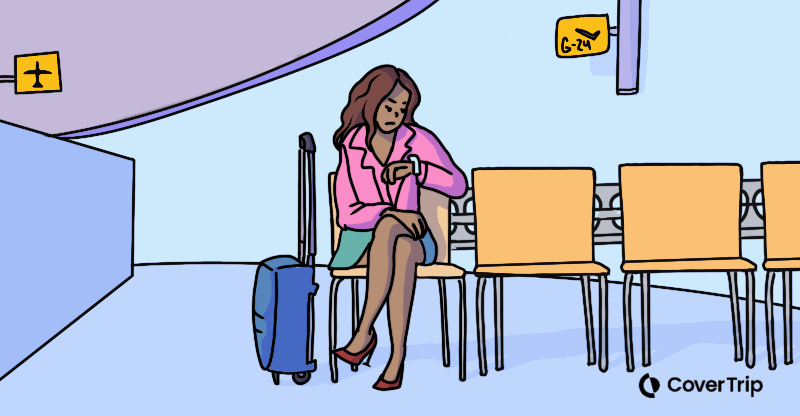How to handle an oversold flight
3 May 2024
Some airline passengers are left behind or ‘bumped’ off a flight, and it can be darned inconvenient. It’s also legal.
During the ‘revenge travel’ season post-COVID, airlines were working hard to recover their losses, and the number of passengers bumped climbed. Approximately 5,000 passengers were denied boarding in 2022 (which probably didn’t help their desire for revenge).
Luckily, a large portion of those denied boardings were actually voluntary, but a trend is a trend, and this one isn’t likely to go away entirely. Certainly not this summer when the number of people flying is expected to rise significantly.
Here’s how to handle an oversold flight.

What getting ‘bumped’ means
Technically, getting bumped means you are denied to board a flight. This typically happens pre-boarding, and it’s always because the airline oversells the flight.
Airlines are allowed to sell more seats than exist on the plane because the historical data and statistical probabilities say at least some passengers won’t show up in time to board.
Empty seats, on the other hand, mean lost revenue for the airline. They’d rather risk bumping some passengers and have the plane full than have an undersold flight.
Who gets bumped?
The US Department of Transportation defines the compensation passengers can expect if the airline oversells the flight (they call it ‘overbooking’).
The DOT also makes it clear that individual airlines are responsible for determining the rules and practices of bumping passengers.
The airlines cannot lawfully bump a passenger based on race or ethnicity. They can, however, use other data related to the passenger, such as the passenger’s check-in time, the fare they paid, or their frequent flyer status to determine who gets bumped.
Warning signs a flight is oversold
If you want advanced warning that there could be an oversold situation, you’re not going to get it. Passengers and airlines make changes all the time, even at the last minute.
In some cases, if there’s flexibility, an airline may decide to switch out the plane to accommodate an oversold passenger list.
In plenty of cases, passengers themselves make changes to their travel plans, including canceling or changing their tickets.
There are, however, a couple of reliable signs a flight may be oversold:
- When you check in (up to 24 hours prior to the flight departure time), there are no empty seats available or the airline’s app asks you to pre-volunteer. That’s the earliest sign you’ll have, especially if you don’t already have a seat.
- When you arrive at the airport, the check-in agents may let you know so you can decide whether to risk checking your bags or not.
- When you arrive at the gate, the agents will let waiting passengers know that the flight may be oversold, and they will start asking for volunteers.
If any of these signs happen, now might be a good time to check the airline’s website and look at the conditions of carriage. This way, you know ahead of time what you’re up against and what you can expect.
What to do when you might be bumped
Before any passengers are bumped off an oversold flight, there is a relatively standard process. Not all airlines follow it, but most do. Here’s what it looks like:
- All the passengers are standing around in the waiting area
- The gate agent announces the flight is oversold and asks for volunteers
This is where you have some choices. You can:
1. Volunteer to get bumped
If there’s flexibility in your schedule, getting bumped can be a pretty sweet deal. This is what you should do before you agree to be bumped:
- Ask what the next available flight is, and this is important: request a confirmed seat (otherwise, you may be flying standby, which may mean you don’t get on that flight either).
- Ask for compensation for food (if the delay is more than 2 hours) and hotel (if the delay is overnight). These are usually issued in the form of vouchers. If you have a place to stay nearby – use these later!
- If you have to leave the airport and don’t have a vehicle, ask for transportation reimbursement.
- Politely ask to receive the maximum financial compensation. (Hint: if you looked up the carrier’s policy, you’ll have that on hand.)
- Consider asking for other perks: lounge access, a free upgrade, etc.
Key takeaway: When the airline asks for volunteers, you have some wiggle room to negotiate, and the payout could be better than the standard compensation for involuntarily bumped passengers. There’s no legal limit to what you can negotiate with the airline.
2. Wait to be involuntarily bumped
Involuntary bumping happens when the airline doesn’t get enough passengers to agree to be voluntarily bumped.
The DOT rules determine how much compensation a passenger is entitled to receive for involuntary boarding denial, and they are based on the amount of time the passenger is delayed.
Travel within the US
- Up to 1 hour delay – no compensation
- 1- to 2-hour delay – 200% of one-way fare (max. $775)
- 2+hour delay – 400% of one-way fare (max. $1,550)
International travel
- Up to 1 hour delay – no compensation
- 1- to 4-hour delay – – 200% of one-way fare (max. $775)
- 4+hour delay – 400% of one-way fare (max. $1,550)
If you are involuntarily bumped, the airline has to fulfill its obligation to get you where you wanted to go. But it can look different than what you originally planned, so it’s important to try to be involved to the extent the agent will let you. For example,
- The airline has the right to schedule alternative modes of transportation for you – like a train ticket.
- If the airline puts you on another flight, ask politely for the seat selection and other services you would have had on the original flight.
Bottom line
If you’re on an oversold flight and you have the flexibility, your best bet is to try to be one of the volunteers simply because you have more room to negotiate.
Many gate agents start bidding and recruiting volunteers, but the last person to volunteer gets a higher payout. If you volunteer, always ask to be compensated at the final amount. That way, you can sit down, relax, and watch the action away from the chaos.
Interesting: As if AI hasn’t infiltrated enough of our lives, it is now altering how airlines fill their planes, and it could be a win-win for all sides.
Related topics
Damian Tysdal is the founder of CoverTrip, and is a licensed agent for travel insurance (MA 1883287). He believes travel insurance should be easier to understand, and started the first travel insurance blog in 2006.
